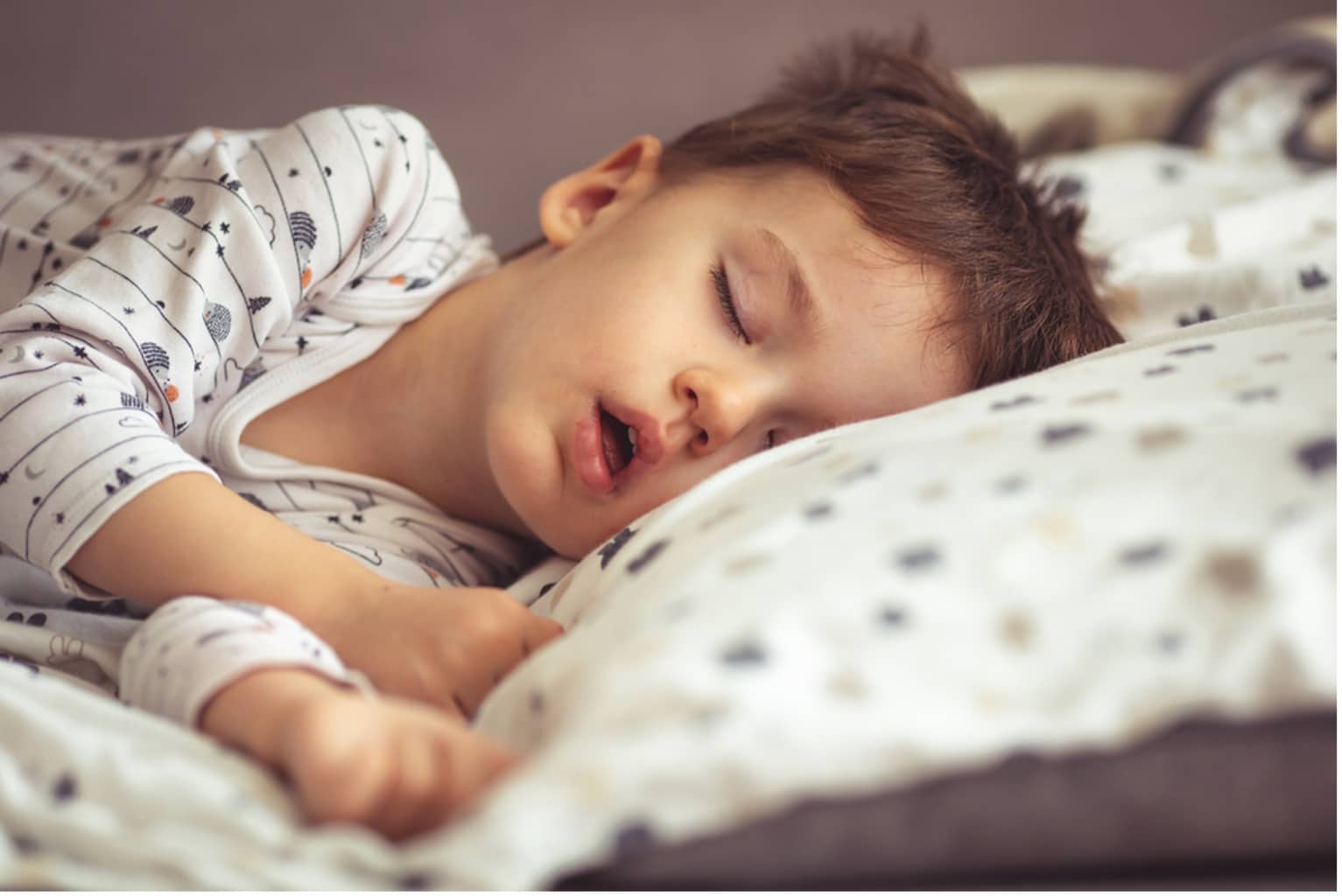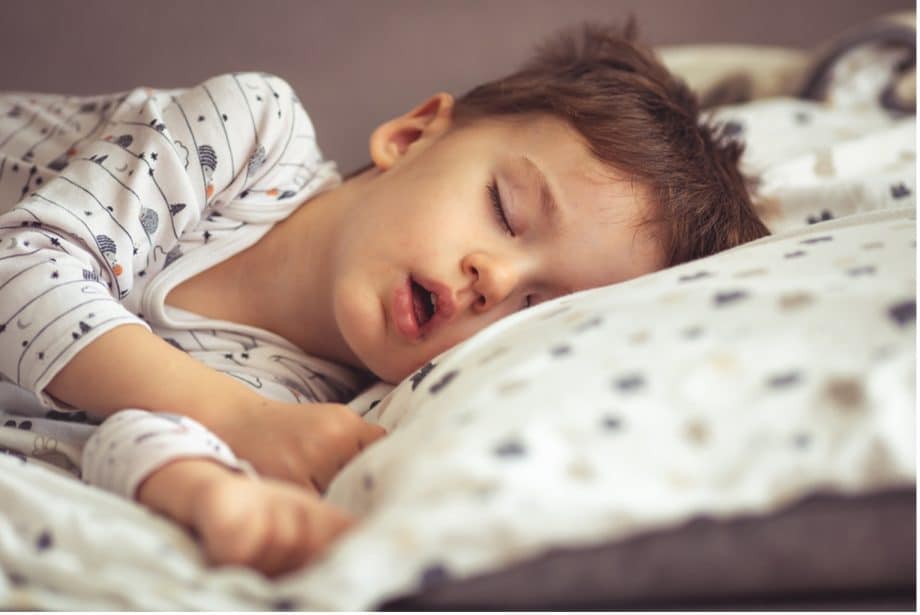Pediatric sleep apnea is way more common than you'd think. This breathing disorder can take a major effect on your child's growth, health, behavior, focus and learning. Not fun!
But when caught early, pediatric sleep apnea is treatable.
The key is knowing what red flags to watch for. In this guide, we'll give you the full lowdown on:
- What exactly is pediatric sleep apnea?
- Common symptoms to be on high alert for
- Potential causes of these breathing issues
- How Dr. Seifelnasr can help evaluate and treat sleep disorders in Lewisville kids
Consider this your crash course in understanding pediatric sleep apnea. Let’s start!
FREE "Parents Guide to Pediatric Sleep Apnea"
What is Pediatric Sleep-Disordered Breathing
"Pediatric sleep-disordered breathing" basically means any kinds of trouble breathing while your munchkin catches sleep. This includes issues like:
- Loud snoring or snorting
- Grinding
- Mouth breathing instead of nose breathing
- Breathing pauses or gasping for air
- Sleep with mouth opened
- Low school Performance
- Dry mouth
Pediatric sleep apnea is when the airway totally collapses or gets blocked over and over during sleep. This prevents normal breathing, resulting in restless, low-quality sleep.
These breathing issues disrupt sleep cycles all night. As a result, kiddos miss out on the deep restorative snoozing their growing bodies and brains need
That's why noticing any potential red flags early is so important. Left ignored, pediatric sleep apnea can seriously impact health, behavior, concentration, learning and safety.
But, good news - when addressed promptly, pediatric sleep disorders are very treatable! Now let's cover what symptoms to keep an eagle eye out for.
Key Symptoms of Pediatric Sleep Apnea to Know
Since pediatric sleep apnea disrupts normal rest, it can cause a wide range of symptoms you might notice in your kid.
Stay vigilant for these common red flags that snooze struggles may be brewing:
- Mouth breathing instead of nasal breathing during sleep
- Tossing and turning throughout the night
- Feeling tired even after long hours of sleep
- Bedwetting or frequent scary nightmares
- Grinding teeth loudly at night
- Crowded, crooked teeth or dental development issues
- Loud snoring, gasping, hissing or talking in sleep
- Poorly aligned bite with overbite or open bite
- Slumped forward head posture instead of straight spine
- Recurrent asthma flare-ups or allergy symptoms
- Dark bluish bags under the eyes
- Moodiness, aggression or irritability during the day
- Trouble paying attention or worsening school performance
If you routinely notice multiple signs of poor or disrupted sleep, don't ignore it! Bring up your concerns to an airway orthodontics provider and an ENT specialist. Left untreated, pediatric sleep apnea can really throw off your child's health and learning.
The sooner you spot issues, the sooner you can work with experts to get relief. Early intervention is critical when it comes to pediatric sleep disorders - it can change everything!

What Triggers Pediatric Sleep Apnea?
Oftentimes it's a combo of physical and environmental factors brewing a perfect sleep apnea storm:
Physical Causes - (H3)
- Small jaw size, reduced airway space and poor forward growth
- Enlarged tonsils and adenoids
- Being overweight or obese
- Tongue tie limiting proper tongue motion and strength
- Structural abnormalities like cleft palate
Environmental Factors - (H3)
- Exposure to secondhand smoke
- Seasonal allergies or chronic nasal congestion
- Lack of breastfeeding or improper latch techniques
- Overusing pacifiers long-term
- Sucking thumbs or fingers past age 3
- Eating only soft foods that don't promote jaw/dental development
As you can see, those boxes can get checked pretty easily these days.
Dr. Seifelnasr notes that modern diets without enough crunchy whole foods can prevent kids from properly developing their facial muscles and jaws. Weak tongue posture and structure makes it hard to maintain open airways during sleep.
This is also why habits like long-term pacifier use and thumb sucking are risky. They allow front teeth to collapse inward and affect tongue position.
Are You Concerned For Your Child’s Heath?
Take Our FREE Sleep Quiz
What Is Airway Orthodontics?
Airway orthodontics is about fixing teeth, bone and neuro musculature and helping you breathe better. It's not just for looks. It helps with problems like snoring and sleep apnea. This approach works by making sure your jaw and air passages are well-aligned.
Traditionally, braces were all about getting a nice smile. But airway orthodontics looks at the bigger picture. It deals with breathing issues too. If your jaw bones are mal-aligned, it can make your airway narrow. This makes it hard to breathe, especially at night.
This method can widen your mouth or adjust your jaw. So, you get a great smile and breathe easier. It's good for kids and adults. Early treatment in kids can help them grow right and avoid breathing problems later. Adults can feel better and sleep better too.
Treating Pediatric Sleep Disorders in Lewisville, TX
Luckily, help for pediatric sleep apnea is available close to home. Dr. Amal Seifelnasr at Castle Hills 3D Orthodontics serves Lewisville and beyond.
As a trusted sleep disorder expert, Dr. Seifelnasr specializes in accurately screening and skillfully treating sleep-disordered breathing oral consequences in children, teenagers and adults.
She uses leading-edge 3D imaging technology to pinpoint the exact cause of your child’s airway collapse. Custom oral appliances are designed to gently guide jaw growth and open restricted airways.
Treatment is 100% non-invasive and life-changing. Kids see real improvement in sleep quality, focus, behavior, learning and overall health. No surgery or masks required!
Parents rave about the personalized care Dr. Seifelnasr provides. She carefully explains every step of the process to families and ensures kids feel comfortable throughout treatment.
Don’t let your child miss out on the restorative sleep they need to thrive! Reach out to Dr. Seifelnasr today to schedule a pediatric sleep evaluation for your little one.
The sooner airway issues are identified and corrected, the better for your child’s growth and wellbeing. Sleepy kiddos want your help, Lewisville parents! Contact Dr. Amal Seifelnasr now - better sleep and brighter days ahead.
Take Action Right Now!
If your kid shows red flags for disrupted breathing and poor sleep, please don’t wait! Left untreated, pediatric sleep apnea can negatively impact health, focus, behavior, academics, safety and quality of life.
Connect with trusted sleep disorder expert Dr. Amal Seifelnasr today. Let him provide your child with the precise evaluation and care they need to sleep soundly and thrive.
Castle Hills 3D Orthodontics
Call 469-598-1700 or book online now to reserve your appointment.
Are You Concerned For Your Child’s Heath?
Take Our Sleep Quiz
Check for Sleep Apnea: Try Our Free Quiz!
FAQs
What’s the difference between snoring and sleep apnea in children?
Snoring means breathing is partially obstructed during sleep, while sleep apnea is when breathing stops completely due to a collapsed airway. Both disrupt quality sleep, but apnea is more severe.
At what age can pediatric sleep apnea start?
Sleep disorders can begin as young as age 2-3 when tonsils and adenoids grow larger. Jaw and airway structures still developing may also contribute to apnea starting early on.
How does pediatric sleep apnea impact behavior and mood?
Lack of quality sleep can lead to hyperactivity, aggression, irritability, anxiety and other behavioral issues in children. Correcting the breathing disorder improves sleep and mood stability.
Can sleep apnea cause bedwetting in children?
Yes, the sleep fragmentation caused by pediatric apnea may hinder the nighttime bladder control developing in some children, leading to bedwetting. Treating the breathing disorder may resolve bedwetting issues.
How does pediatric sleep apnea affect growth?
Growth hormone is produced during deep sleep stages. Pediatric apnea disrupts this, potentially hindering proper growth and development.
When should I take my child to an ENT vs. a dentist?
ENTs handle issues like enlarged tonsils and adenoids contributing to apnea, while orthodontic providers correct structural causes like narrow jaw size, overbites, jaw malalignment, etc. Patients have to see both specialists.
How can pediatric sleep apnea be corrected?
Treatment may involve a combination of airway-focused orthodontics, oral appliances, ENT procedures, and more - depending on the cause.
Does my child need surgery?
Not always! Many pediatric breathing issues can be corrected non-surgically through airway-focused orthodontics to guide proper facial growth and structure.
What results can I expect after pediatric sleep apnea treatment?
Successfully correcting sleep disordered breathing leads to improved sleep, focus, concentration, academic performance, behavior, growth and overall health.

